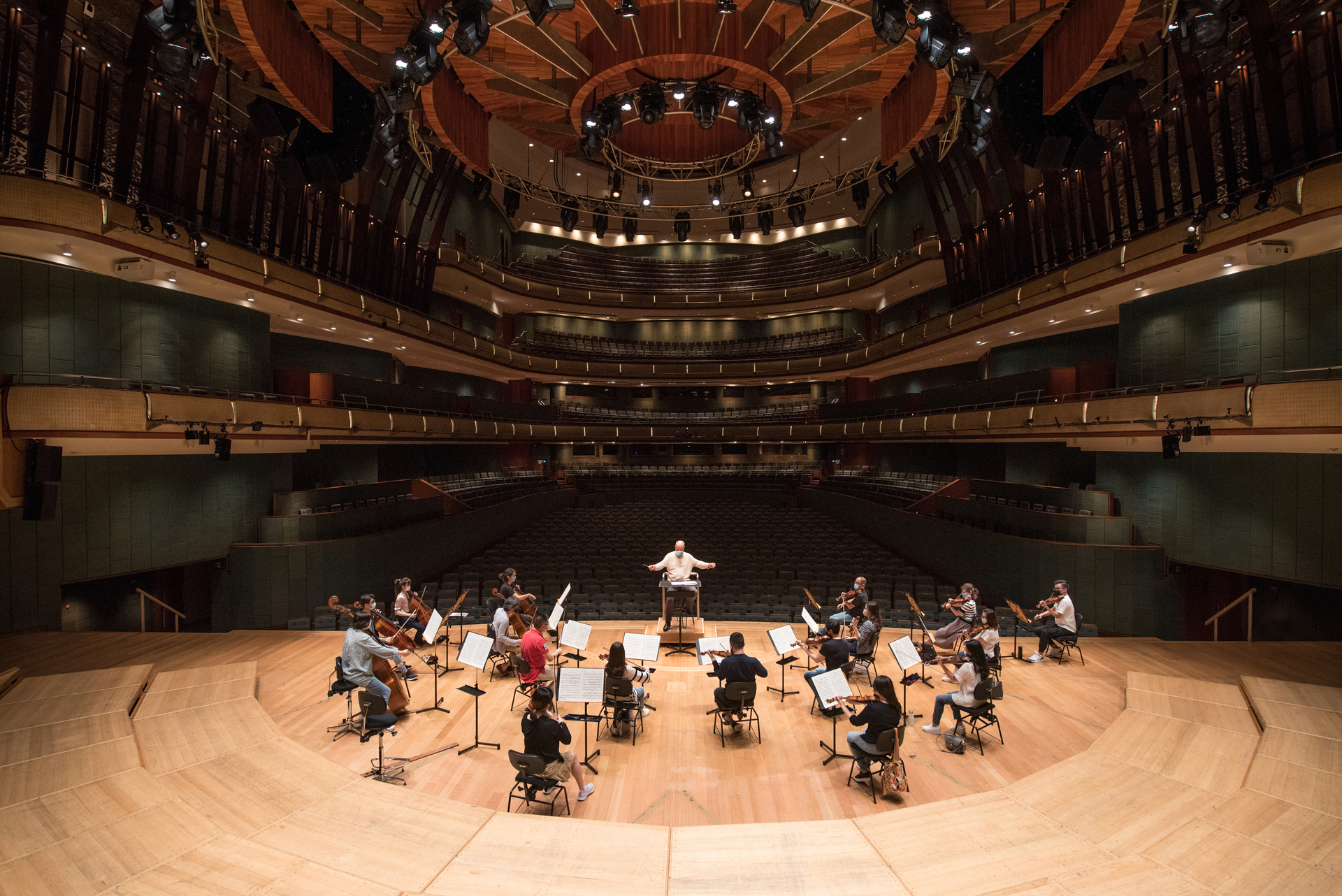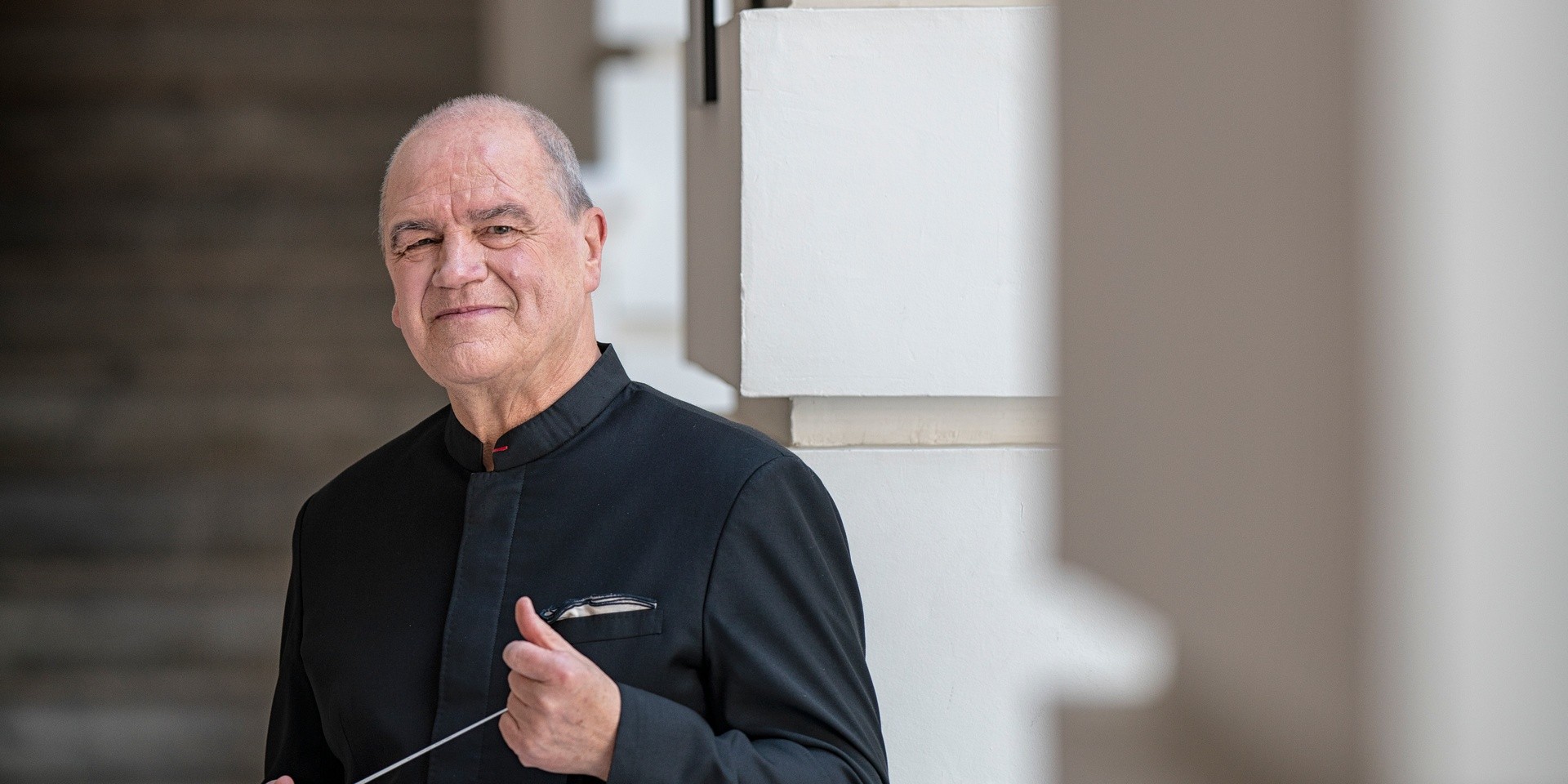Maestro Hans Graf is ready to take the grand stage again.

On 2 June, the Singapore Symphony Orchestra (SSO) announced that Hans Graf will step up and assume the title of Music Director of the SSO for the upcoming 2022/23 season. Maestro Graf was previously appointed Chief Conductor of the SSO from the 2020/21 season.
Maestro Graf has previously led several distinguished orchestras in North America and Europe, including the Houston Symphony, Orchestre National Bordeaux Aquitaine, and the Mozarteum Orchestra Salzburg.
The SSO 2022/23 season will commence with an exclusive Temasek Foundation SSO Hans Graf Inaugural Concert on 28 and 29 July, marking a new milestone in SSO's extensive legacy under Maestro Graf's baton.
Ahead of the upcoming season, Bandwagon caught up with Maestro Graf and spoke with him about his thoughts on being appointed Music Director, his artistic vision moving forward, as well as the difficulties he faced in leading the orchestra as Chief Conductor amidst the pandemic.
Nice to meet you, Maestro Graf. What have you been busy with lately?
I’m back here in Singapore. We just had an associate conductor audition. We are also having a heavy week of CD recordings for Paul von Klenau. The week before I was in Austria, and before that it was Denmark. It’s a very challenging programme. So, the normal life of a conductor [laughs].
Speaking of Paul von Klenau, you had an open rehearsal recently celebrating his works. Tell us a bit more about him and his significance to you.
On Tuesday, we had an open rehearsal to cast attention on [Klenau]. And it was also meant for us to have a concert performance experience before we record the piece.
Klenau is a conductor who died in 1946 in Denmark. He was completely alone, unrecognised, and out of favour. Since then, Danish cultural institutions have decided to have a deep and intense look at Klenau’s life and work, and they are editing his scores and music. It is a huge endeavour to record all his works. So that’s how I got to know this composer who was unfamiliar to me. I got to evaluate him, I got to really appreciate what he's done. And we are now giving a belated birth to two children of his mind — the Piano Concerto (1944) and Violin Concerto (1922). We’re really interested to put him back into the spotlight.
Paul von Klenau, like other conductors of the first half of the 20th century, was in the shade of other giants. Another conductor [like Klenau] is Alexander Zemlinsky. He died completely unknown in America. His work is very important and now musicians, concert promoters, and orchestras are discovering their wonderful works to play and enrich their repertoires. And now the time has come for people to rediscover what they’ve been missing.
You’ve previously mentioned that the pandemic provided you with a “happy absence from the concert stage” and allowed you to “rediscover your library”.
Yes, that was very nicely put. Everybody has a way to take advantage of idle time. And I took advantage of the time by preparing for my work.
Do you think the break from conducting has recalibrated your outlook and vision on conducting?
I’ve changed my conducting habits a little bit, but not deliberately. I can't judge because I’m too close to myself. Perhaps I got a little bit quieter and felt more pressure.
You took over the title of Chief Conductor of the SSO amidst the pandemic. Looking back, how was it like navigating such a tricky situation where live concerts had to be cancelled?
The [Singapore Symphony] Orchestra survived amidst the pandemic quite well. They remained undamaged as compared to other orchestras which went under. They did everything to bring me here by getting me a Green Lane Agreement. I'm in my room, I go to the rehearsal, I come back, I dine in my room. My personal life was very limited, but it was not quarantine. So this is a way of working efficiently and respecting the rules of COVID-19. I was working with the orchestra constantly, more than I thought because they couldn't get other guest conductors.

What would you say was the biggest challenge in keeping the SSO spirit alive?
Not being able to play as a full orchestra.
Let me compare it to a football team. There are 11 players. If they don't play together for a while, they’re not in shape. If they play 3 versus 3, it's not the same. So we have to play 80 people at once for a live audience. An orchestra which doesn't play together can still play very well. But playing together is such interaction of millions of bits of information. You sit, you hear your neighbour, you see the conductor, you hear the brass, and all that gets into your system. Playing in an orchestra is a hugely complicated, well-trained collective skill, which is more than the sum of playing an instrument well.
This year, the SSO has reopened itself to large-scale concerts with a live audience. How does it feel to be able to conduct in front of a live audience after such a long time?
Yes, we had two concerts so far, which we called “test balloons”. If the test balloons flew, we would go on. And the test balloons did fly.
The first concert had a challenging programme: Dmitri Shostakovich. [He’s] a Russian composer who is very popular but challenging for [both] the players and the audience. So we served our audience a difficult problem, you have to be open-minded to appreciate him. And it was very well-received.
Then we have a programme with the Singapore National Youth Orchestra. The stage was cracking with musicians, and the hall was cracking. Every single seat was sold despite the fact that everybody had to undergo a test before entering.
We were optimistic that if the virus relents a little bit, and regulations got more humane and more manageable, we'll be able to play. And here we are.
What would you say is the biggest difference between a recorded performance and a live performance?
A live stream [concert] has the advantage that you can sit at home, lean back, and watch on the small screen. But also, if you come later, I think you can still watch it.
But it's like you're eating canned food. Canned food can be really good. And if there's no other choice, it's fantastic. But as soon as restaurants are open, as soon as concerts are open, you'll see people stream[ing] there. A hungry audience is a good audience.

It was just announced today that you will be the new Music Director for the 2022/23 SSO season. How do you feel about that and what are your long range artistic vision and your goals for this upcoming season?
There are many great guest conductors, many great soloists, and many great works lined up.
One plan I can talk of is that we are having an Artist-In-Residence next season. We'll record with this really fabulous young violin player, Chloe Chua. We want to record an album with her and it will be released soon. Fingers crossed.
We're [also] trying to recruit musicians for the orchestra. Some musicians have retired while some moved to other orchestras in other cities due to family reasons. We have 10 positions to fill at the moment.
We're preparing for my first real big concert since before COVID-19. We're doing the real thing with the full orchestra. And this is in July, it’s our big Inaugural Concert. And then the whole season will follow.
What may audiences expect from the upcoming season and how would it be different from the previous two seasons that you’ve led as Chief Conductor?
As mentioned, the upcoming season will have great guest conductors and soloists. They will be announced in time. And it will be a different playing field finally with a live audience.
But we will not do incredible things which have never been done. If we say everything will be different, we'll lose half of the audience. If we say we do everything the same, we'll lose 10%.
Every season is about exploring new things. I can tell you that I will be playing my first couple of concerts with the SSO chorus. I was at the rehearsals and they've been preparing programmes for this season already. I love them and I look forward to working with them. We will record and play a very dignified work that was not recorded for both chorus and orchestra. And it's a great discovery, a little bit like Klenau. It's a great work of art for orchestra soloists and chorus. This is one of the highlights and there are a couple of other things too. So I promise, it's not boring.
So would you say every new season is about balancing the old and the new?
Yes. As Music Director, I am responsible in part for the success of the orchestra, both artistically and commercially. I have to find interesting works to keep the enthusiasm for playing alive. Also, I have to widen the horizons of [the orchestra] by finding new works and challenging them to play really difficult things.
Do you have a favourite venue to play in Singapore?
Esplanade and Victoria Concert Hall. They’re very different from each other, but both are very good. Many cities are envious that we have these great venues.

I also have one secret wish. I would like to perform in a big hangar at Changi Airport. Take out the planes and close the doors. I would play there.
So you've mentioned that the orchestra is looking for more players. Do you have a word for any young players who are considering joining the Orchestra?
Yes. To all young musicians, be enthusiastic and try to play as well as you can. And if God wants, you will be a soloist. But mostly God doesn't want you as a soloist but as an orchestra musician and that is still a great honour. (laughs)
There's an old joke from Vienna. A foreign young man asks, “How do I get to the Philharmonic Orchestra?” The coachman of the carriage replies, “Practice, young man.”
Maestro Hans Graf will lead the SSO in the upcoming 2022/23 season as Music Director. Check out the concert schedule and purchase your tickets here.
Like what you read? Show our writer some love!
-


